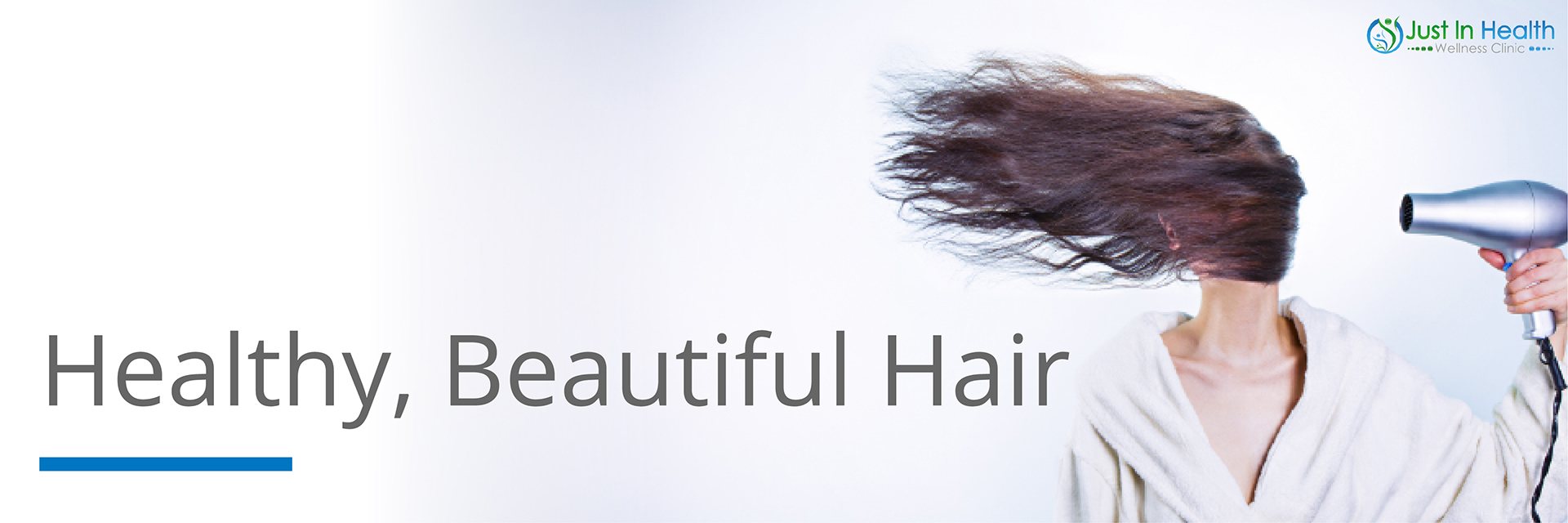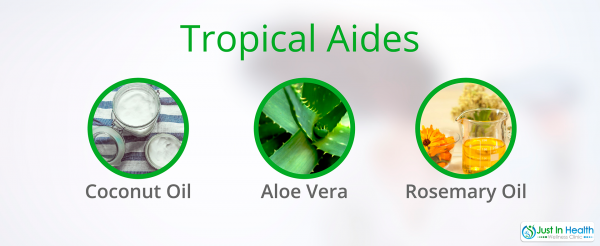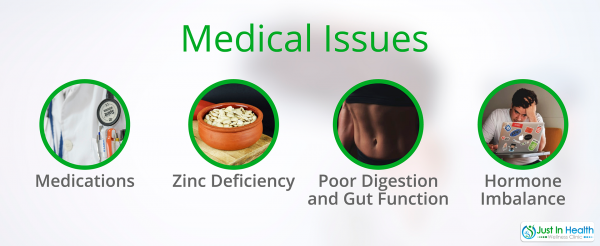

By Dr. Justin Marchegiani
Thick, luscious hair is an immediately visible sign of good health. However, many of us struggle to obtain shampoo commercial locks. There are many ways we can target healthy hair growth, including dietary changes, the use of topical aides, and determining any possible medical interferences.

There are several foods and supplements you can consume in order to aide in hair growth.
A Vitamin B complex containing both biotin and other important B vitamins, which have been shown to strengthen hair as well as improve skin and nails.
Collagen promotes the growth of not only hair but also supports skin, nails, and joints. One of the best sources of collagen is in bone broth. Read more about the benefits of bone broth here! Sometimes bone broth isn't enough and a high-quality grass fed collagen supplement is needed. Click here to see the one Dr. J recommends.
More foods to eat for hair growth and full-body health include the omega-3s from wild-caught fish, antioxidant-rich green tea, and foods rich in vitamins A and C such as bell pepper, broccoli, and sweet potato.
Note: Be sure to avoid the common culprits of many modern diseases and health issues: trans fats, sugar, and alcohol.

You probably already have several items in your pantry that can be applied to your hair and scalp to stimulate hair growth and prevent breakage!
Coconut oil is extremely moisturizing and prevents damage to ends, which means less split ends. Applied to your scalp and roots, coconut oil can stimulate hair growth and healthy follicles. You can also use coconut oil as a conditioner in the shower!
Aloe Vera contains many vitamins and minerals that are vital for strong and healthy hair. It is also powerful against dandruff, as aloe vera is antibacterial and antifungal. Whether used as a topical aide and left on the scalp or taken internally, aloe vera is a powerhouse for luscious locks.
Rosemary oil is believed to increase cellular metabolism that stimulate hair growth. There has even been research showing rosemary oil working as well as conventional hair loss medication!

There are several medical issues that may prevent hair from achieving its healthiest state, including disruptive medications and nutritional deficiencies.
Medications can cause more damage than one might realize. Blood thinners, steroids, antifungal medications, antibiotics, cholesterol-lowering medications, birth control pills and other oral contraceptives, NSAIDs, chemotherapy medications, thyroid medications, antidepressants, acne medications, and high blood pressure medications are just some of the commonly prescribed medications that can cause hair thinning, amongst other issues.
A zinc deficiency due to stress, poor diet, leaky gut, use of medications (NSAIDs, acid blockers, antibiotics, etc) will inhibit hair growth. Grass-fed beef and pumpkin seeds are two great sources of zinc to add to your diet.
Poor digestion and gut function will wreak havoc on more than just your hair growth. Many people experience thinning hair and hair loss due to incomplete protein digestion as a result of insufficient stomach acid. Likewise, a healthy microbiome is necessary for your body to carry out its daily routine. Leaky gut and other gut problems affect all areas of your health, so it is important to keep your gut in check.
Hormone imbalances can be due to stress, pregnancy, menopause, PCOS, as well as thyroid and adrenal issues. In fact, even male-pattern baldness can be attributed to hormones. It is very important to have your hormones checked if you are experiencing hair loss or other issues that may be linked to your hormones. Luckily, once the issues are resolved, normal hair growth should resume.
Tackling healthy hair growth both inside and out is sure to see some results. Working with a functional medicine doctor to help you determine any hormone imbalances or interferences from medications can help make the process go a lot smoother.
Sources:
http://drjockers.com/healthy-hair-care/
http://drjockers.com/10-nutrition-tips-for-healthy-hair/
https://draxe.com/vitamins-for-hair-growth/
https://draxe.com/natural-treatments-for-thinning-hair/
https://draxe.com/how-to-thicken-hair/
https://draxe.com/hair-loss-remedies/
https://draxe.com/coconut-oil-for-hair/